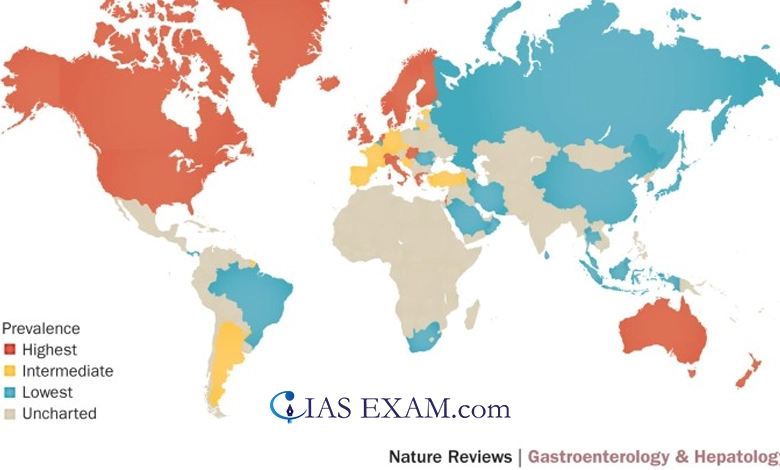Global Rise in the Incidence of Inflammatory Bowel Disease
Syllabus: Health [GS Paper-2]

Context
In recent years, the levels of IBD incidence have been recorded with a significant hike globally, and leading to an immense health burden. The inflammatory bowel disease (IBD) is a persistent condition indicating inflammation in the digestive tract.
Epidemiology of IBD
- As recently the IBD was misunderstood to be an exceptionally rare ailment but its numbers of patients have surged dramatically during the preceding years.
- In the estimation of the World Health Organization (WHO), the rate of incidence of IBD lies somewhere between 0.5% or more with a sharp increase in figures through the years.
- A very high prevalence is usually in the U.S. and Europe, while the smallest occurrence rates are in Asia or Africa.
Causes of the Global Rise in IBD Incidence
- Genetic factors: A result of a gene transfer we would thus be given a winning card for IBD.
- Environmental factors: Environmental factors such as smoking, stressing and dietary modifications may occur as the main cause of the uneven occurrence of IBD.
- Changes in gut microbiome: A microbiome imbalance within the gut is one of the principal reasons underlying IBD origin.
- Increased awareness and diagnosis: Higher level of expertise of the healthcare workers and recent technological advancement are the main causes that have resulted in uncovering the disease at its early stages.
Consequences of IBD
IBD has significant consequences on the quality of life, economy, and healthcare systems. Some of the consequences include:
- Chronic symptoms: People with IBD suffer from inflammatory bowel disease (IBD), as in the case of an intestinal inflammation which causes abdominal pain, diarrhoea, and fatigue.
- Complications: ICD can potentially lead to malnutrition, osteoporosis and other health complications due to intestinal lining damage or even colon cancer.
- Economic burden: IBD on patients and healthcare systems has a tremendously huge financial impact.
- Psychological impact: When IBD occurs there would be the element of trauma in the psychological aspect of the disease, for instance, nearly 20 to 30% suffer from anxiety and mostly 10% suffer from depression.
Measures to Address the Global Rise in IBD Incidence
- Increased awareness and education: The significance of understanding of the different symptoms of the diseases by healthcare workers, patients and the public is such an issue nowadays.
- Research and development: This is due to ongoing research on causes of IBD. However, finding an effective cure is possible by taking into account what is revealed in studies.
- Dietary changes: Diets that contain more fibre watch out with processed foods can possibly bring to rest the IBD related symptoms to a state that is manageable.
- Stress management: Tactics like meditation, yoga, or any other stress reducing methods have great potentials of decreasing IBD symptoms severity.
Conclusion
The global rise in the incidence of IBD is a significant public health concern that requires immediate attention. Understanding the causes and consequences of IBD is crucial to developing effective measures to address this growing health concern. Increased awareness, research, dietary changes, and stress management are some of the measures that can help reduce the incidence and impact of IBD.
Source: The Hindu
UPSC Prelims Practice Question
Q. Which of the following represents a chronic inflammatory condition affecting the gastrointestinal tract and has seen a global rise in its incidence?
a) Irritable Bowel Syndrome (IBS)
b) Gastric Ulcer
c) Inflammatory Bowel Disease (IBD)
d) Gastroenteritis
Ans – “c”





.png)



